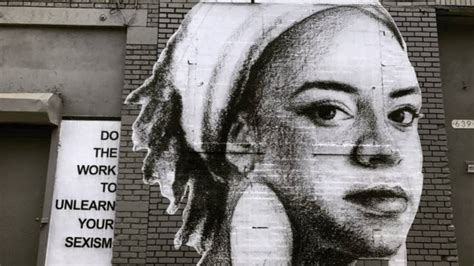Top 15 Quotes & Sayings by Tatyana Fazlalizadeh
Explore popular quotes and sayings by Tatyana Fazlalizadeh.
Last updated on November 25, 2024.
It's been kind of extreme - people either love it or they don't like it at all - and I think that's a good thing. It's my first art project where there's not a middle ground. I find it very interesting. But the negative feedback hasn't at all kept me from doing it, obviously. Because I haven't really gotten any negative feedback that I feel is really warranted.
I feel like we're looked at as either completely nonsexual characters or overly sexual characters, and I feel like that affects how we're treated in the public space by men. I believe that women of color experience street harassment in a very hyper way. So I wanted to draw these women in their very normal, regular states and put those images out there in the public for people to see, instead of these other, very sexualized, images of women.
I think it's very important to get this stuff on film, not just the behind-the-scenes of the process, but also the interviews with the women. We're going to try to do some on-the-street filming, getting people's reactions to the work, and seeing if we can get some street harassment happening on film so people can see what we're talking about. It's important to have some type of documentation so people can see what happens when we create this artwork and why I'm creating it.
You're treated as though you're just a piece of meat, and you're there for consumption by men. I feel like the common thing is men feeling entitled to treat you how they want to treat you. You never feel as though you have a right to the space. And so that's the theme behind most of the posters - "I'm not outside for your entertainment" and "I'm not seeking your validation."
Men who are offenders of street harassment and women who experience street harassment can walk by and feel something about it, because it's out there in the environment where the harassment actually happens. So it's a lot more powerful than an oil painting that's stuck in a gallery or under my bed or in my studio where only a couple of eyes are going to see it, as opposed to it being in an environment where it could possibly effect a change.

















